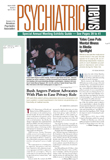I have come to appreciate the fact that APA members are most willing to register their thoughts and suggestions on psychiatric issues to their elected leadership. In complex times, like these we live in, this communication has allowed both an early warning and a diversity of opinion that has advanced the causes of our patients and our profession.
This issue of Psychiatric News is packed with items that will increasingly affect each of us. I cannot remember a time when psychiatric issues were so prominent in the national media and the political and regulatory process. I cannot remember a time when so many members of APA were involved in helping to create and to guide these media stories and shepherd legislation and regulations on state and federal levels. Our members who have developed their skills in working up front and/or behind the scenes add value to these programs and articles and continue to show their professionalism by making sure that the best interest of the patient is at the forefront of each.
A vexing problem for me as president is being called by a reporter from a prominent newspaper or national newsmagazine and being asked, “What is APA’s position on this issue?” In most cases, I must respond that APA has no official policy, and I can only give them my own opinion as one individual psychiatrist. APA’s position statements require approval by the Assembly and the Board of Trustees. In a group of 36,000 psychiatrists, there are many opinions strongly held. For instance, we have no official policy on the death penalty in general, but we do have a policy against the death penalty for capital offenses committed by a minor. As we go forward, we will need to develop official policies based on scientific evidence, clinical experience, and the ethics of our profession. It will take an open mind, professional skills, and hard work to develop these policies. Perfection is the enemy of good.
The debate around confidentiality of medical records continues to heat up. All psychiatrists understand that privacy and confidentiality in the doctor-patient relationship and confidentiality of medical records are essential to good patient care. Many of our medical colleagues are concerned with the burden of assuring that confidentiality is placed on physicians and the clinics and hospitals in which they work. This eternal tension between the right of individuals to protect their medical information and the “need” for access of systems so that payment and operations can be maintained continues to seesaw back and forth between Congress and the current administration. When in doubt, we do what is best for the patient; however, our medical colleagues are feeling smothered by regulations and paperwork, and they are therefore less enthusiastic now than before about confidentiality. Maintaining our strong alliances for confidentiality will become only more problematic but absolutely necessary.
During the March meeting of the Board of Trustees in Washington, D.C., the Board granted more than $50,000 in funds to four psychiatric associations to help them address the scope-of-practice issues in their states. In addition, the Board of Trustees voted to approve the recommendation of the Membership Committee to empower the district branches and state associations with the authority to decide whether to offer dues amnesty to former members with the understanding that the national APA would also offer amnesty of APA dues to former members only if the district branches offered amnesty and with the further understanding that the reinstated members would pay dues in advance for the year in which they are being reinstated. This will, it is hoped, clarify the many questions that I receive about former members who would like to again become active.
As I mentioned at the start of this article, I get many requests or questions. They come in three general forms.
• What are the current activities of APA in dealing with this issue?
• Why doesn’t somebody at APA do something to ____?
• I am concerned about ____. What can I do to be more effective in my state or with my representatives in Congress in helping them see what is best for our patients?
The third question most recently came from a medical student from UCSF who matched for psychiatry and was concerned that professionals in one state would be placing patients at risk by prescribing medications without a medical degree and without an adequate medical education. He wanted to be sure that New Mexico was an aberration in this country and that it would be considered the high-water mark of such ill-advised legislation. With future psychiatrists thinking and acting as advocates for our patients, we have less to fear about the alleged “domino effect.” That theory proved incorrect in Southeast Asia, and we must see to it that the same happens here. We can do that. ▪

